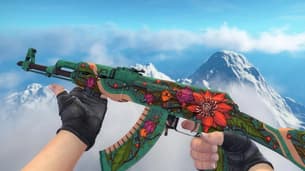
Кіберспортивні огляди, новини та проходження відеоігор
 Огляд VALORANT Masters Santiago 2026Гайд по VALORANT Masters Santiago 2026: команди, дати, формат та призовий фонд $1 млн.
Огляд VALORANT Masters Santiago 2026Гайд по VALORANT Masters Santiago 2026: команди, дати, формат та призовий фонд $1 млн. VALORANT Masters Santiago 2026: Повний список рівнів команд та посібник з Pick’EmVALORANT Masters Santiago 2026 вже близько. Ми розглянемо повний список рівнів, пояснимо шанси кожної команди та поділимося прогнозами Pick’Em, щоб допомогти вам зрозуміти, хто є фаворитами.
VALORANT Masters Santiago 2026: Повний список рівнів команд та посібник з Pick’EmVALORANT Masters Santiago 2026 вже близько. Ми розглянемо повний список рівнів, пояснимо шанси кожної команди та поділимося прогнозами Pick’Em, щоб допомогти вам зрозуміти, хто є фаворитами. Огляд плей-оф 28-го сезону DreamLeague у Dota 2Дізнайтеся все про плей-оф DreamLeague Season 28: команди, формат, призовий фонд та прогнози.
Огляд плей-оф 28-го сезону DreamLeague у Dota 2Дізнайтеся все про плей-оф DreamLeague Season 28: команди, формат, призовий фонд та прогнози. ESL Pro League Season 23: Огляд онлайн-етапуОгляд онлайн-етапу 23-го сезону ESL Pro League: команди, швейцарський формат, розподіл призів, фінали LAN у Стокгольмі та ключові претенденти, за якими варто стежити.
ESL Pro League Season 23: Огляд онлайн-етапуОгляд онлайн-етапу 23-го сезону ESL Pro League: команди, швейцарський формат, розподіл призів, фінали LAN у Стокгольмі та ключові претенденти, за якими варто стежити. Traxus: Нагороди та завдання фракції МарафонTraxus OffWorld Industries — найпотужніша корпорація Марафону — тут представлені всі покращення, контракти та нагороди, які пропонує фракція.
Traxus: Нагороди та завдання фракції МарафонTraxus OffWorld Industries — найпотужніша корпорація Марафону — тут представлені всі покращення, контракти та нагороди, які пропонує фракція.
 Марафон: Як розблокувати фракції та отримати їхні нагородиMarathon вийде 5 березня 2026 року на ПК, PS5 та Xbox Series X|S — ось як працює Factions.
Марафон: Як розблокувати фракції та отримати їхні нагородиMarathon вийде 5 березня 2026 року на ПК, PS5 та Xbox Series X|S — ось як працює Factions.
 Марафонський серверний слем розпочинається: точний час початку та нагородиСерверний турнір Bungie Marathon Server Slam триватиме з 26 лютого по 2 березня. Дізнайтеся більше про час початку, безкоштовні нагороди та як приєднатися.
Марафонський серверний слем розпочинається: точний час початку та нагородиСерверний турнір Bungie Marathon Server Slam триватиме з 26 лютого по 2 березня. Дізнайтеся більше про час початку, безкоштовні нагороди та як приєднатися.
 Resident Evil Requiem: дата виходу, видання, геймплейДізнайтеся про видання Resident Evil 9 (Requiem), ціни і платформи. Подробиці попереднього замовлення, інформація про Ракун-Сіті та нові можливості гри для ПК, PS5, Xbox і Switch 2.
Resident Evil Requiem: дата виходу, видання, геймплейДізнайтеся про видання Resident Evil 9 (Requiem), ціни і платформи. Подробиці попереднього замовлення, інформація про Ракун-Сіті та нові можливості гри для ПК, PS5, Xbox і Switch 2. Список подій на карті Arc Raiders (погодні умови)Найповніший посібник зі стану карти Arc Raiders, включаючи розклади, деталі здобичі та стратегії для кожної події.
Список подій на карті Arc Raiders (погодні умови)Найповніший посібник зі стану карти Arc Raiders, включаючи розклади, деталі здобичі та стратегії для кожної події.
 Оновлення «Оповітне небо» (патч 1.17.0) для Arc Raiders: що насправді змінилосяArc Raiders 1.17 “Shrouded Sky” додає погоду для ураганів, нових ворогів, налаштування зброї, оновлення карти та покращення якості життя.
Оновлення «Оповітне небо» (патч 1.17.0) для Arc Raiders: що насправді змінилосяArc Raiders 1.17 “Shrouded Sky” додає погоду для ураганів, нових ворогів, налаштування зброї, оновлення карти та покращення якості життя.Найкращі статті
 Топ-10 найкращих браузерних покі-ігорПоговоримо про те, у що можна пограти на популярному сервісі з ностальгічними браузерними проектами.
Топ-10 найкращих браузерних покі-ігорПоговоримо про те, у що можна пограти на популярному сервісі з ностальгічними браузерними проектами. Найдорожчі скіни ножів CS2 та CS:GO у 2026.Хочете купити машину? А може, внутрішньоігровий скін за ту саму ціну може бути кращим?
Найдорожчі скіни ножів CS2 та CS:GO у 2026.Хочете купити машину? А може, внутрішньоігровий скін за ту саму ціну може бути кращим? 10 найкращих скінів M4A4 для CS2 та CS:GO, які можна придбати в 2026.Розповідаємо про найкращі варіанти надзвичайно популярної штурмової гвинтівки M4A4 у відомому шутері.
10 найкращих скінів M4A4 для CS2 та CS:GO, які можна придбати в 2026.Розповідаємо про найкращі варіанти надзвичайно популярної штурмової гвинтівки M4A4 у відомому шутері. 15 найкращих скінів для АК у CS2 та CS:GO, які можна купити сьогодніРозповідаємо про найкращі варіанти скінів на найпопулярнішу штурмову зброю в CS:GO.
15 найкращих скінів для АК у CS2 та CS:GO, які можна купити сьогодніРозповідаємо про найкращі варіанти скінів на найпопулярнішу штурмову зброю в CS:GO.  Найкращі скіни для ОГС, які варто купити у 2023 році: Бюджетний список (до $500)Розглянемо найкрасивіші скіни в CS:GO на AK-47, AWP, M4A1-S, USP-S, Desert Eagle та інші.
Найкращі скіни для ОГС, які варто купити у 2023 році: Бюджетний список (до $500)Розглянемо найкрасивіші скіни в CS:GO на AK-47, AWP, M4A1-S, USP-S, Desert Eagle та інші. Найкращі маркетплейси ОГС 2026: Де купувати та продавати скіни CSGOДавайте з'ясуємо, де найкраще купувати косметичні засоби для вашого інвентарю.
Найкращі маркетплейси ОГС 2026: Де купувати та продавати скіни CSGOДавайте з'ясуємо, де найкраще купувати косметичні засоби для вашого інвентарю. 


